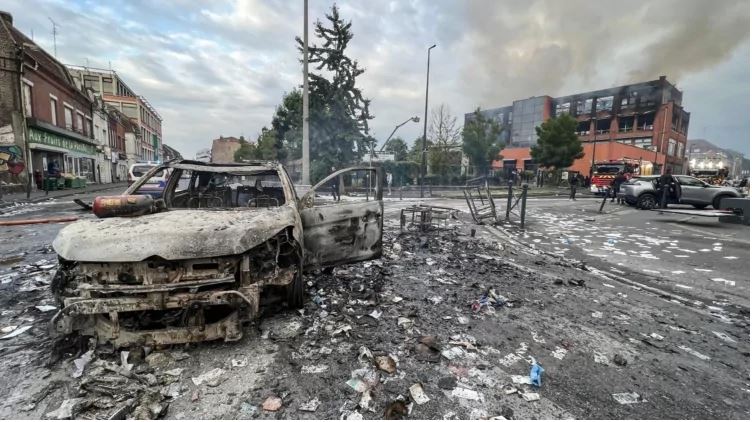 So the latest round of rioting in France seems at last to have burned itself out. In the end, it didn’t expand into a Muslim revolution; it didn’t succeed in overthrowing the French Republic; it didn’t lead to the first transformation of a Western republic into a sharia state. But this doesn’t mean that France won’t eventually be brought down in such a way, and sooner rather than later. All it will take is one more minor police action that triggers the nation’s Muslims into a tsunami of fierce and extraordinary violence – a tsunami that, unlike this time, doesn’t end until it makes the Reign of Terror look like a scene from Gigi.
So the latest round of rioting in France seems at last to have burned itself out. In the end, it didn’t expand into a Muslim revolution; it didn’t succeed in overthrowing the French Republic; it didn’t lead to the first transformation of a Western republic into a sharia state. But this doesn’t mean that France won’t eventually be brought down in such a way, and sooner rather than later. All it will take is one more minor police action that triggers the nation’s Muslims into a tsunami of fierce and extraordinary violence – a tsunami that, unlike this time, doesn’t end until it makes the Reign of Terror look like a scene from Gigi.
Certainly the cooling-off of Muslim rage owed nothing whatsoever to the efforts of Emmanuel Macron or any other French leader. Nor did it owe anything to the French electorate which – although it’s been offered the opportunity in recent years to install in the Élysée Palace a principled and intrepid agent of change like Marine le Pen, Valérie Pécresse, or Éric Zemmour – has instead voted repeatedly for more of the same. Voted, that is, for hopeless establishment types like Macron, who over the years has spoken out of both sides of his mouth on the immigration issue – celebrating Muslim imports as an economic boon, then formulating a five-point program to defeat “Islamic separatism,” then “clarifying” his plan with a declaration of his deep respect for the Islamic faith.
Meanwhile Macron blamed the nationwide agitation on – believe it or not – video games. The New York Times managed to avoid focusing on the titanic scale of the turbulence by treating it all as a political challenge for Macron as well as by running an inane article about one Mama Diakité who, during the rioting, was banned by a court from wearing a hijab when playing on a soccer team – a ruling that, according to the Times, underscored the same “long-simmering issues of identity and inclusion in France” that, in that newspaper’s view, explain the killing of Nahel Merzouk and the convulsions that followed.
In the magazine Foreign Policy, you could read that the French rioting was caused by “systemic violence and racism” on the part of French police (a claim supported by quotes from not one but two French professors). Similarly, you could read a Washington Post article entitled “How the killing of a teen fits into France’s history of police brutality,” and, in the Los Angeles Times, an Associated Press dispatch headlined “Shooting in France shows U.S. is not alone in struggles with racism, police brutality.”
In France, a Le Monde editorial noted, fairly enough, that “the political consensus to overcome the democratic crisis seems much weaker than in past crises,” pointing out that while far-left politicians like Jean-Luc Mélenchon have, in their usual fashion, attributed the riots to grinding poverty, Zemmour has described them as “the prodromes of a civil war” – the word prodrome, in both English and French, meaning “an early symptom that signals the onset of an illness or disease.”
Surfing the net, I came across a bracingly frank take on the French crisis by an Indian columnist, Arindam Mukherjee. “West Europe, through France,” he wrote on July 3, “is having a sneak peek at how its moment of reckoning will look.” Yep. “The proverbial chickens have come home to roost, and there is nothing that their governments can do or are willing to do about it. They can best put it under the carpet and pretend that all is well.” Mukherjee lamented that “momentous works” like Douglas Murray’s The Strange Death of Europe and Michel Houellebecq’s Submission “fall uselessly by the side as the politicians in governments continue serving their globalist overlords, and the legitimate population continues to be ignorant, indifferent, and unorganised.”
Ten years ago, I wrote here about a nonfiction bestseller, La France Orange Méchanique (France Clockwork Orange) by the pseudonymous Laurent Obertone, whose subject was the extraordinary increase in violent crime throughout France that has been caused by mass immigration from the Muslim world. “From 1830 all the way up to the outbreak of World War II,” I wrote, citing Obertone, “French crime rates were a tiny fraction of what they are now; from 1980 to 2000, the rate of violent crime multiplied by a factor of five.” And one thing you can be sure of is that that rate hasn’t declined in the 23 years since.
After La France Orange Méchanique, Obertone published a dystopian novel, Guerrilla (2016); two sequels followed. These fictions (which I haven’t read) imagine a French civil war that begins with a clash in one of the immigrant suburbs between police and a violent youth gang. On June 30, in the midst of the riots, Obertone granted an interview to a French website in which he acknowledged that the killing in Nanterre that triggered the recent wave of destruction bore a “striking” resemblance to the events that set off the war depicted in his trilogy:
The government is just as cowardly, the suburbs just as quick to ignite, the citizenry just as passive, the police just as muzzled, the media and other left-wing hustlers just as perfect in their active complicity….as I’ve been saying for a long time, this country is a can of gasoline with only a spark missing.
Obertone asserted that the French government “could regain popularity if it responded with real firmness” to the Muslim rioting. But, he said, France’s leaders are too “terrified” to do nothing other than issue empty promises, make empty speeches, and pretend that everything is just fine – right up “until the next episode” occurs. “The problem,” Obertone explained, “seems to them far too big to face.”
And what of native Frenchmen? The majority of them, Obertone lamented, are still maddeningly passive. Disinclined to speak up about the Muslim immigrant problem, they cling to the hope “that things will settle down” and that their lives can return to normal “without too many shocks.” Such a stance by the general public during what is “arguably the greatest ordeal [France] has ever faced,” Obertone complained, is dragging the Republic into a position of ever greater “laxity and submission” – which, unless the French surprise us all by finally waking up and taking action, is guaranteed, alas, to lead the land of Voltaire, Pasteur, and Flaubert to a highly predictable, and terribly tragic, end.
Originally published in FrontPage Magazine and Richardson Post.










